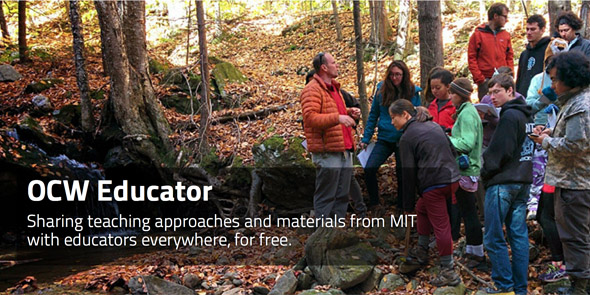Resources for Innovation
About Open CourseWare Educator

What is OCW Educator?
OCW Educator is a faculty-inspired initiative to share teaching approaches and materials with educators at MIT and around the world, for free. It is part of MIT OpenCourseWare.
What kinds of teaching approaches and materials does OCW Educator share?
OCW Educator collects MIT instructors’ insights about a variety of pedagogical topics related to the courses they publish on OCW. Examples include: active learning, assessment, teaching communication, facilitating discussions, developing students’ professional competences, teaching the design process, problem solving, teaching with digital tools, engaging students in project-based learning, facilitating workshops, and connecting content to real-world contexts. Faculty members share their insights in sections of their OCW courses called “This Course at MIT.” This section contextualizes the course by describing the pedagogy shaping it, which makes it an especially useful addition to discussion-, writing-, or project-based courses that are structurally different from traditional lecture-recitation formats. Faculty also share a variety of teaching materials when they publish their courses on OCW. Examples include assignments, essay questions, reading lists, syllabi, projects with examples, image galleries, etc.
How can SHASS faculty benefit from OCW Educator?
All of the teaching approaches and materials you’ll find in SHASS OCW courses have been shared by SHASS faculty and instructors: it’s a collection of our school’s collective knowledge and expertise. In this way, OCW Educator opens doors to SHASS classrooms, allowing our faculty to explore how colleagues within our school approach a variety of different teaching challenges. It’s a logical place for our new faculty to begin exploring how teaching happens within SHASS, and for experienced faculty to both share their tried and true strategies with colleagues and to find inspiration for new approaches and materials to use in the classroom. OCW Educator features a finder tool that makes it convenient to search for the instructional approaches and teaching materials you need. Finally, OCW Educator serves as a communication outlet for sharing and spotlighting innovative SHASS pedagogy with educators across the Institute.
How have SHASS faculty participated in OCW Educator in the past?
Since the launch of OCW Educator in 2013, SHASS faculty members have contributed over 50 “This Course at MIT” pages, over 30% of the total pages contributed by faculty in all schools across MIT. SHASS faculty have contributed some of the most in-depth and inspiring “This Course at MIT” pages in the MIT OpenCourseWare collection, often sharing how discussion-based and workshop-based courses succeed. They have also offered some of the richest insights related to developing students’ critical thinking skills.
What new kinds of SHASS teaching approaches and materials would OCW Educator like to publish?
OCW Educator sees SHASS as a pioneering force behind flipped classrooms and other recent “innovations” in education. For decades, faculty in SHASS have been structuring their courses in such a way that students read, write, and think outside of class in order to participate in rich discussions and other active learning experiences within the classroom.
More recently, SHASS educators have been employing a variety of new techniques in this effort. Among these are surveys, online group discussions, and annotation tools. OCW Educator would like to capture how faculty go about facilitating rich discussions, active participation, projects, teamwork, writing workshops, collective annotation experiences, etc. This kind of information would be of great interest both to educators in other MIT schools and beyond the Institute.
OCW Educator is also particularly interested in publishing the teaching materials that make these kinds of learning experiences possible. For example, perhaps you ask students to generate discussion questions before class. OCW would like to publish the questions they develop. Or perhaps you engage students in peer-editing their work. OCW would like to share the rubrics you use to scaffold this experience. Maybe field trips are a central component of your course. OCW would like to publish the materials you use to prepare students to get the most out of these experiences.
How can interested SHASS faculty participate in OCW Educator?
When you publish a course on OCW, let your OCW Digital Publication Specialist (DPS) know you’re interested in sharing your teaching insights. Your DPS will send you a customized questionnaire. You may respond to the questionnaire via email, or request a brief in-person interview. OCW creates your “This Course at MIT” page based on your responses. You’ll review your “This Course at MIT” page, along with the rest of your course, when it is ready. You can make revisions and edits at that time.
The total faculty time commitment for creating a “This Course at MIT” page is about an hour (including sharing your insights and reviewing the final page).Learn more about the process by contacting:
Sarah Hansen
OCW Project Manager
sehansen@mit.edu
Cheryl Siegel
OCW Publication Manager
csiegel@mit.edu
Top image courtesy of Taylor Perron